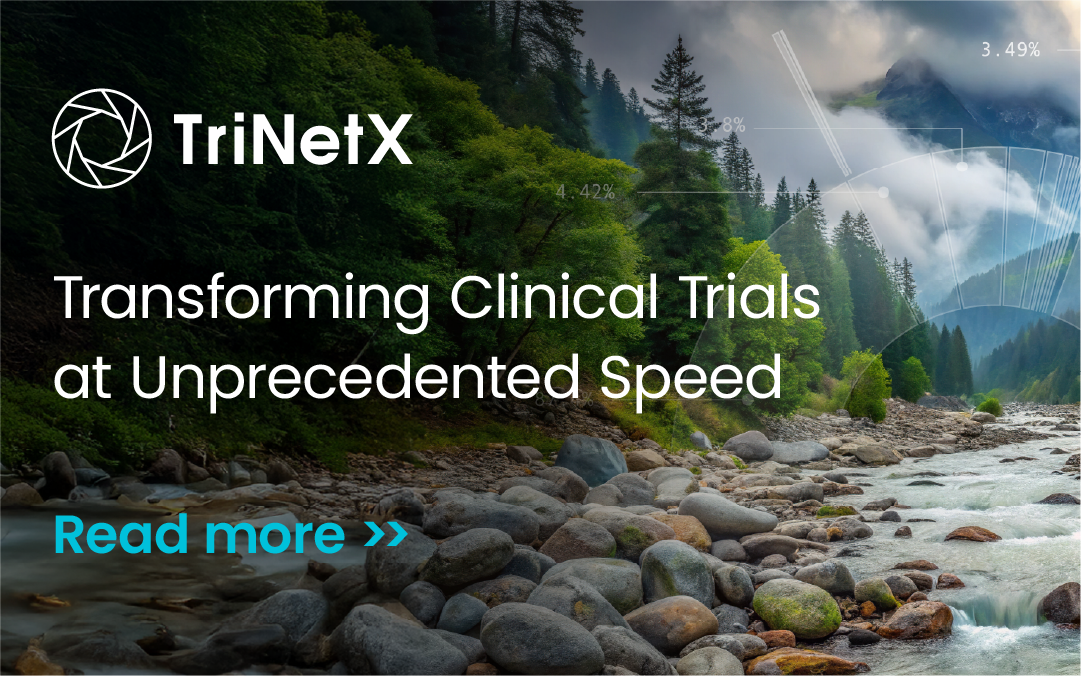Clinical trials are vital to drug development but often face challenges such as slow patient recruitment, high costs, and suboptimal trial designs. Today, artificial intelligence (AI) and real-world data (RWD) are transforming this process by optimizing trial protocols, enhancing recruitment, and accelerating timelines.
At SCOPE 2025, industry leaders discussed AI’s integration into clinical research, spanning early exploration to full implementation. The U.S. government has also joined the movement, launching the Stargate AI Initiative in January 2025 under President Trump to strengthen AI’s role in healthcare. With support from both industry and government, AI is poised to revolutionize clinical research, expediting drug development and bringing treatments to patients faster than ever before.
AI and RWD Synergy: The TriNetX Impact
One notable application of AI and RWD is the digital waiting room, an innovative approach that allows physicians to monitor potential trial candidates in real time before they meet eligibility criteria. TriNetX leverages extensive electronic health record (EHR) datasets to identify these candidates, ensuring a steady pipeline of eligible participants and improving overall recruitment efficiency.
AI and RWD are also instrumental in advancing diversity in clinical trials. Recognizing the challenges of meeting diversity enrollment targets, TriNetX collaborated with a pharmaceutical company to develop a machine learning (ML)-based diversity protocol evaluation model. This model optimizes trial protocols by analyzing different combinations of eligibility criteria, ensuring a balance between diversity and scientific integrity.
Beyond recruitment and diversity, AI-driven models are reshaping disease prediction and intervention strategies. One such breakthrough involves predicting inflammatory bowel disease (IBD) progression and flares. In collaboration with a top pharmaceutical company, TriNetX developed an ML model that uses real-time clinical data to identify IBD patients at risk of treatment escalation within seven days, enabling clinical trial coordinators to prioritize patients with the highest risk. This innovative approach has the potential to significantly improve trial enrollment success rates, increasing clinical trial conversion from 33 percent to as high as 85 percent for Crohn’s disease (CD) and 70 percent for ulcerative colitis (UC).
A breakthrough in early pancreatic cancer detection is emerging through ML as well. Traditional screening guidelines primarily focus on genetic or familial risk factors, which account for only 10 percent of pancreatic cancer cases. To expand detection beyond these limited criteria, the ML model analyzed a vast dataset of 35,000 pancreatic cancer patients and 1.5 million non-cancer patients across 55 health systems. This analysis identified 87 top predictive features for Pancreatic Ductal Adenocarcinoma (PDAC), offering a more comprehensive approach to assessing risk.
What makes this model particularly powerful is its ability to predict who is at risk of developing pancreatic cancer within the next 18 months. By generating risk thresholds with varying performance metrics, the model allows for tailored decision-making. Depending on the chosen threshold, healthcare providers can take different courses of action—ranging from sending high-risk patients directly to imaging to using the model as a standalone early detection tool. Alternatively, a broader threshold could be set, casting a wider net for potential cases, followed by biomarker testing to refine the at-risk population.
For instance, CA 19-9, a well-established biomarker for pancreatic cancer, could be integrated into a tiered screening approach. The model would first identify an enriched at-risk population from the general public, which would then undergo biomarker testing before proceeding to imaging. To validate this approach, a pilot study is currently underway at one healthcare organization, where researchers are acting on the model’s predictions by recruiting patients above a certain risk threshold for biospecimen collection and biomarker analysis.
Additional AI and RWD Breakthroughs
AI and RWD are also making an impact in several other areas of healthcare innovation. Here are three more applications:
- Unveiling Disease Progression Patterns: AI-powered predictive analytics enable researchers to tailor trials to patient subgroups most likely to respond positively to treatment. This data-driven precision minimizes trial-and-error approaches, significantly enhancing efficiency.
- Ushering In an Era of Personalized Medicine: AI is paving the way for precision medicine, where treatments are tailored to individual patients based on genetic, biological, and lifestyle factors. For example, AI-powered tools are already being used to predict which prostate cancer patients will benefit from additional hormonal therapy when undergoing radiation treatment.
- Repurposing Existing Drugs with AI Insights: By analyzing vast datasets, AI identifies hidden correlations between existing drugs and new therapeutic applications. This accelerates drug discovery while reducing costs by repurposing already-approved compounds.
The Future of AI in Clinical Research
The convergence of AI and RWD is driving one of the most profound transformations in modern medicine. However, as AI reshapes healthcare, ethical considerations—such as data integrity, algorithmic bias, and transparency—must remain at the forefront.
Continuous validation of AI models is essential to ensure accuracy and fairness across diverse patient populations. By utilizing large, representative datasets and embedding ethical AI practices, researchers can develop models that are not only powerful but also responsible.
The future is now. AI-driven insights are helping to expedite drug approvals, deliver more effective treatments, and ultimately improve patient outcomes worldwide. The question is no longer whether AI will revolutionize clinical research but how quickly we can implement these breakthroughs to maximize their impact on global health.
Want to further explore RWD and AI applications in healthcare? Download TriNetX’s eBook, Artificial Intelligence for the Good of Healthcare: Opportunities for Responsible AI in Clinical Research & Drug Development.
About Justin North
Over the last decade, Justin has led dozens of software solutions from idea to commercial release with companies including Phillips Healthcare, goBalto, and Oracle. He brings a deep background in data science and clinical research to his role as Director of Product Management at TriNetX, where he has overseen the development of products for trial design and feasibility.

